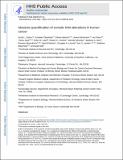| dc.contributor.author | Carter, Scott L. | en_US |
| dc.contributor.author | Cibulskis, Kristian | en_US |
| dc.contributor.author | Helman, Elena | en_US |
| dc.contributor.author | McKenna, Aaron | en_US |
| dc.contributor.author | Shen, Hui | en_US |
| dc.contributor.author | Zack, Travis | en_US |
| dc.contributor.author | Laird, Peter W. | en_US |
| dc.contributor.author | Onofrio, Robert C. | en_US |
| dc.contributor.author | Winckler, Wendy | en_US |
| dc.contributor.author | Weir, Barbara A. | en_US |
| dc.contributor.author | Beroukhim, Rameen | en_US |
| dc.contributor.author | Pellman, David | en_US |
| dc.contributor.author | Levine, Douglas A. | en_US |
| dc.contributor.author | Lander, Eric S. | en_US |
| dc.contributor.author | Meyerson, Matthew | en_US |
| dc.contributor.author | Getz, Gad | en_US |
| dc.date.accessioned | 2015-05-04T15:25:36Z | |
| dc.date.issued | 2015 | en_US |
| dc.identifier.citation | Carter, S. L., K. Cibulskis, E. Helman, A. McKenna, H. Shen, T. Zack, P. W. Laird, et al. 2015. “Absolute quantification of somatic DNA alterations in human cancer.” Nature biotechnology 30 (5): 413-421. doi:10.1038/nbt.2203. http://dx.doi.org/10.1038/nbt.2203. | en |
| dc.identifier.issn | 1087-0156 | en |
| dc.identifier.uri | http://nrs.harvard.edu/urn-3:HUL.InstRepos:15034760 | |
| dc.description.abstract | We developed a computational method (ABSOLUTE) that infers tumor purity and malignant cell ploidy directly from analysis of somatic DNA alterations. ABSOLUTE can detect subclonal heterogeneity, somatic homozygosity, and calculate statistical sensitivity to detect specific aberrations. We used ABSOLUTE to analyze ovarian cancer data and identified pervasive subclonal somatic point mutations. In contrast, mutations occurring in key tumor suppressor genes, TP53 and NF1 were predominantly clonal and homozygous, as were mutations in a candidate tumor suppressor gene, CDK12. Analysis of absolute allelic copy-number profiles from 3,155 cancer specimens revealed that genome-doubling events are common in human cancer, and likely occur in already aneuploid cells. By correlating genome-doubling status with mutation data, we found that homozygous mutations in NF1 occurred predominantly in non-doubled samples. This finding suggests that genome doubling influences the pathways of tumor progression, with recessive inactivation being less common after genome doubling. | en |
| dc.language.iso | en_US | en |
| dc.relation.isversionof | doi:10.1038/nbt.2203 | en |
| dc.relation.hasversion | http://www.ncbi.nlm.nih.gov/pmc/articles/PMC4383288/pdf/ | en |
| dash.license | LAA | en_US |
| dc.title | Absolute quantification of somatic DNA alterations in human cancer | en |
| dc.type | Journal Article | en_US |
| dc.description.version | Version of Record | en |
| dc.relation.journal | Nature biotechnology | en |
| dash.depositing.author | Zack, Travis | en_US |
| dc.date.available | 2015-05-04T15:25:36Z | |
| dc.identifier.doi | 10.1038/nbt.2203 | * |
| dash.authorsordered | false | |
| dash.contributor.affiliated | Weir, Barbara Ann | |
| dash.contributor.affiliated | Zack, Travis Ian | |
| dash.contributor.affiliated | Pellman, David | |
| dash.contributor.affiliated | Lander, Eric | |


